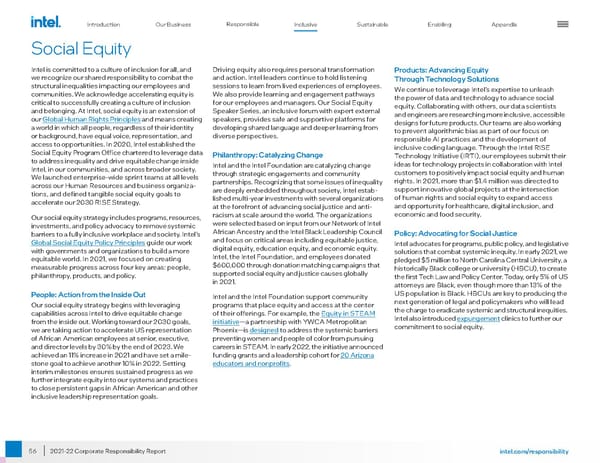56 intel.com/responsibility 2021-22 Corporate Responsibility Report Social Equity Intel is committed to a culture of inclusion for all, and we recognize our shared responsibility to combat the structural inequalities impacting our employees and communities. We acknowledge accelerating equity is critical to successfully creating a culture of inclusion and belonging. At Intel, social equity is an extension of our Global Human Rights Principles and means creating a world in which all people, regardless of their identity or background, have equal voice, representation, and access to opportunities. In 2020, Intel established the Social Equity Program Office chartered to leverage data to address inequality and drive equitable change inside Intel, in our communities, and across broader society. We launched enterprise-wide sprint teams at all levels across our Human Resources and business organiza - tions, and defined tangible social equity goals to accelerate our 2030 RISE Strategy. Our social equity strategy includes programs, resources, investments, and policy advocacy to remove systemic barriers to a fully inclusive workplace and society. Intel’s Global Social Equity Policy Principles guide our work with governments and organizations to build a more equitable world. In 2021, we focused on creating measurable progress across four key areas: people, philanthropy, products, and policy. People: Action from the Inside Out Our social equity strategy begins with leveraging capabilities across Intel to drive equitable change from the inside out. Working toward our 2030 goals, we are taking action to accelerate US representation of African American employees at senior, executive, and director levels by 30% by the end of 2023. We achieved an 11% increase in 2021 and have set a mile - stone goal to achieve another 10% in 2022. Setting interim milestones ensures sustained progress as we further integrate equity into our systems and practices to close persistent gaps in African American and other inclusive leadership representation goals. Driving equity also requires personal transformation and action. Intel leaders continue to hold listening sessions to learn from lived experiences of employees. We also provide learning and engagement pathways for our employees and managers. Our Social Equity Speaker Series, an inclusive forum with expert external speakers, provides safe and supportive platforms for developing shared language and deeper learning from diverse perspectives. Philanthropy: Catalyzing Change Intel and the Intel Foundation are catalyzing change through strategic engagements and community partnerships. Recognizing that some issues of inequality are deeply embedded throughout society, Intel estab - lished multi-year investments with several organizations at the forefront of advancing social justice and anti- racism at scale around the world. The organizations were selected based on input from our Network of Intel African Ancestry and the Intel Black Leadership Council and focus on critical areas including equitable justice, digital equity, education equity, and economic equity. Intel, the Intel Foundation, and employees donated $600,000 through donation matching campaigns that supported social equity and justice causes globally in 2021. Intel and the Intel Foundation support community programs that place equity and access at the center of their offerings. For example, the Equity in STEAM initiative —a partnership with YWCA Metropolitan Phoenix—is designed to address the systemic barriers preventing women and people of color from pursuing careers in STEAM. In early 2022, the initiative announced funding grants and a leadership cohort for 20 Arizona educators and nonprofits . Products: Advancing Equity Through Technology Solutions We continue to leverage Intel’s expertise to unleash the power of data and technology to advance social equity. Collaborating with others, our data scientists and engineers are researching more inclusive, accessible designs for future products. Our teams are also working to prevent algorithmic bias as part of our focus on responsible AI practices and the development of inclusive coding language. Through the Intel RISE Technology Initiative (IRTI), our employees submit their ideas for technology projects in collaboration with Intel customers to positively impact social equity and human rights. In 2021, more than $1.4 million was directed to support innovative global projects at the intersection of human rights and social equity to expand access and opportunity for healthcare, digital inclusion, and economic and food security. Policy: Advocating for Social Justice Intel advocates for programs, public policy, and legislative solutions that combat systemic inequity. In early 2021, we pledged $5 million to North Carolina Central University, a historically Black college or university (HBCU), to create the first Tech Law and Policy Center. Today, only 5% of US attorneys are Black, even though more than 13% of the US population is Black. HBCUs are key to producing the next generation of legal and policymakers who will lead the charge to eradicate systemic and structural inequities. Intel also introduced expungement clinics to further our commitment to social equity. Introduction Our Business Responsible Sustainable Enabling Appendix Introduction Our Business Responsible Sustainable Enabling Appendix Inclusive Inclusive
 Intel Corporate Responsibility Report Page 55 Page 57
Intel Corporate Responsibility Report Page 55 Page 57